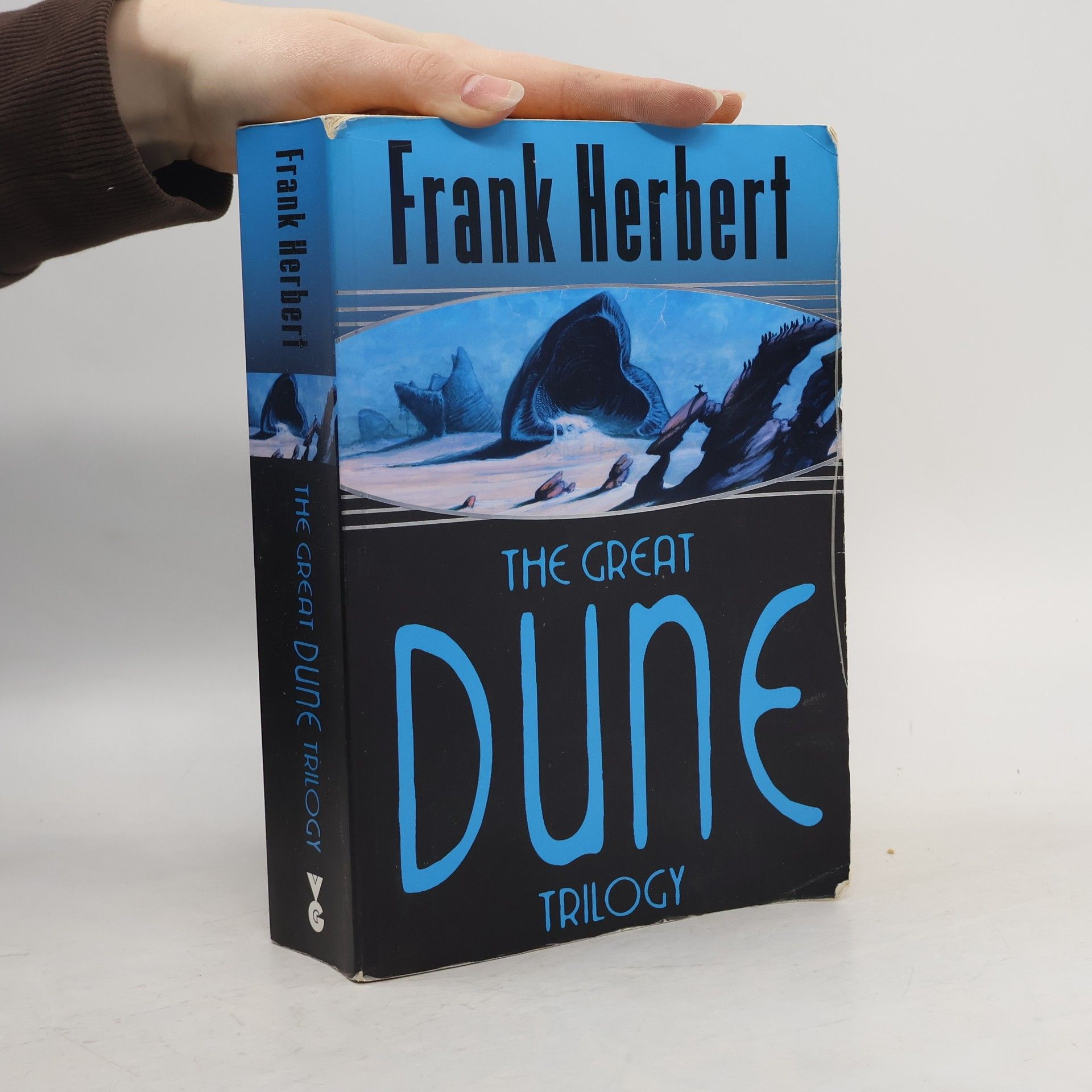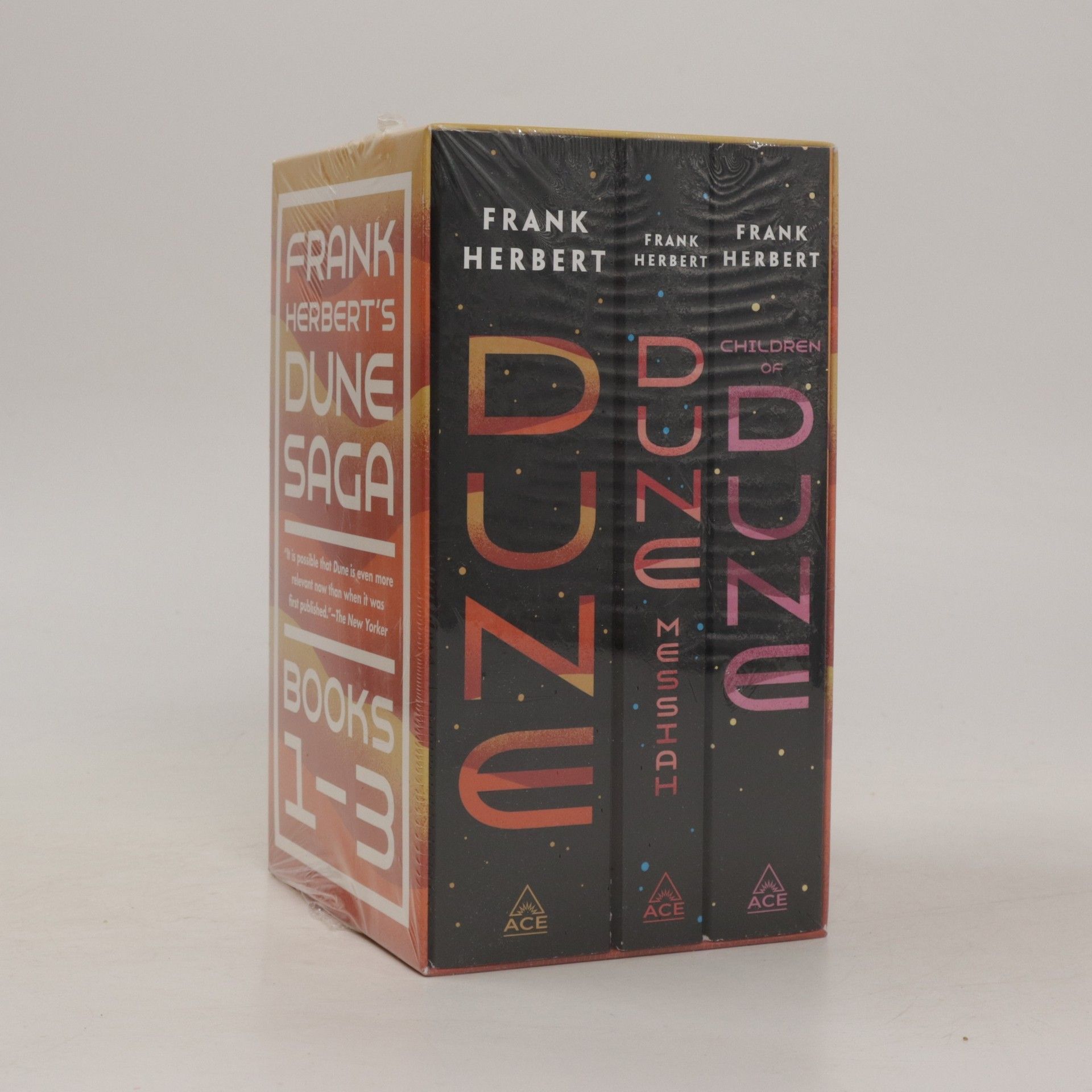This beautiful boxed set includes the first six novels of Frank Herbert's acclaimed Dune Saga, perfect for both longtime fans and new readers. Set in a distant future on a remote planet, this epic science fiction series is a triumph of imagination, featuring titles like DUNE and its sequels.
Frank Herbert Books
Frank Herbert was an American science fiction author celebrated for his ability to delve into complex themes. His works often explore profound questions of human evolution, ecology, and the intersection of religion, politics, and power. Through masterful storytelling and intricate world-building, Herbert examines the fragility of human existence and the force of collective will against unimaginable challenges. His literary legacy lies in his capacity to provoke thought about our future and our place within the universe.







Discover the ultimate collector's boxed set featuring deluxe hardcover editions of Frank Herbert's Dune saga: Dune, Dune Messiah, and Children of Dune. This exquisite set includes a slipcase with original art, iconic new covers, stained edges, and illustrated endpapers, chronicling Paul Atreides' epic journey on Arrakis.
The Great Dune Trilogy
- 912 pages
- 32 hours of reading
Herbert's evocative, epic tales are set on the desert planet Arrakis, the focus for a complex political and military struggle with galaxy-wide repercussions. Arrakis is the source of spice, a mind enhancing drug which makes interstellar travel possible; it is the most valuable substance in the galaxy. When Duke Atreides and his family take up court there, they fall into a trap set by the Duke's bitter rival, Baron Harkonnen. The Duke is poisoned, but his wife and her son Paul escape to the vast and arid deserts of Arrakis, which have given the planet its nickname of Dune. Paul and his mother join the Fremen, the Arrakis natives, ho have learnt to live in this harsh and complex ecosystem. But learning to survive is not enough - Paul's destiny was mapped out long ago and his mother is committed to seeing it fulfilled.
Stranded beyond the solar system, the starship Earthling faces disaster as its Organic Mental Cores malfunction. With thousands of hibernating colonists aboard, a desperate skeleton crew attempts to create an artificial consciousness in the ship's computer. This risky endeavor could either lead them safely to Tau Ceti or pose a catastrophic threat to humanity. The story explores themes of survival, artificial intelligence, and the fragility of human life in the vastness of space.
• DUNE: PART TWO • THE MAJOR MOTION PICTURE Directed by Denis Villeneuve, screenplay by Denis Villeneuve and Jon Spaihts, based on the novel Dune by Frank Herbert • Starring Timothée Chalamet, Zendaya, Rebecca Ferguson, Josh Brolin, Austin Butler, Florence Pugh, Dave Bautista, Christopher Walken, Stephen McKinley Henderson, Léa Seydoux, with Stellan Skarsgård, with Charlotte Rampling, and Javier Bardem Frank Herbert’s classic masterpiece—a triumph of the imagination and one of the bestselling science fiction novels of all time. Set on the desert planet Arrakis, Dune is the story of Paul Atreides—who would become known as Muad'Dib—and of a great family's ambition to bring to fruition mankind's most ancient and unattainable dream. A stunning blend of adventure and mysticism, environmentalism and politics, Dune won the first Nebula Award, shared the Hugo Award, and formed the basis of what is undoubtedly the grandest epic in science fiction.
SF Gateway Omnibus. The Dragon in the Sea, The Santaroga Barrier, The Dosadi Experiment
- 800 pages
- 28 hours of reading
In "The Dragon in the Sea," oil becomes the prize in a war between East and West, as psychologist John Ramsay goes undercover on a subtug, facing isolation and danger. "The Santaroga Barrier" explores a seemingly normal community with unsettling secrets. "The Dosadi Experiment" depicts a tormented human-alien society seeking vengeance against their creators.
The Second Great Dune Trilogy contains God Emperor of Dune, Heretics of Dune and Chapter House Dune, and concludes the Dune Chronicles, one of the most influential SF series ever written. Herbert’s evocative, epic tales are set on the desert planet Arrakis, the focus for a complex political and military struggle with galaxy-wide repercussions. More than three thousand years have passed since the first events recorded in Dune. Only one link survives with those tumultuous times: the grotesque figure of Leto Atreides, son of the prophet Paul Muad’Dib, and now the virtually immortal God Emperor of Dune. He alone understands the future, and he knows with a terrible certainty that the evolution of his race is at an end unless he can breed new qualities into his species. But to achieve his final victory, Leto Atreides must also bring about his own downfall… Read the series which inspired the 2021 Denis Villeneuve epic film adaptation, Dune, starring Oscar Isaac, Timothée Chalamet, Zendaya and Josh Brolin.
The Ascension Factor
- 384 pages
- 14 hours of reading
This final book in the "Destination: Void" collaboration between Frank Herbert and Bill Ransom, set twenty-five years after the previous book The Lazarus Effect , concludes the story of the planet Pandora.
Dune Messiah ( Dune #2 )
- 352 pages
- 13 hours of reading
With millions of copies sold worldwide, Frank Herbert's magnificent Dune novels stand among the major achievements of the human imagination as one of the most significant sagas in the history of literary science fiction. Dune Messiah continues the story of Paul Atreides, better known-and feared-as the man christened Muad'Dib. As Emperor of the Known Universe, he possesses more power than a single man was ever meant to wield. Worshipped as a religious icon by the fanatical Fremens, Paul faces the enmity of the political houses he displaced when he assumed the throne-and a conspiracy conducted within his own sphere of influence.And even as House Atreides begins to crumble around him from the machinations of his enemies, the true threat to Paul comes to his lover, Chani, and the unborn heir to his family's dynasty.

